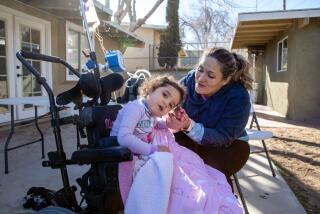‘There’s always that special patient that gives you that good feeling after you’ve given care’
- Share via
Lorene Schwartz, 58, graduated in 1953. Her son Kent, 25, finished school last May. What bonds the mother and son as much as family is a common profession. They are both registered nurses in Grossmont Hospital’s emergency room. The team was interviewed by Times staff writer G. Jeanette Avent and photographed by David McNew.
Kent: I first went to Colorado State University on a football scholarship. As far back as when I was 7 years old, I’ve always wanted to play football. In high school, I always thought I’d go into biology or oceanography, but football was the main thing. But I decided to dump the scholarship and come back to San Diego, because I wanted more academics. I came back here thinking I’d pick up another scholarship, but I injured my knee playing touch football. So that ended that.
Then I got into nursing at Grossmont College. I didn’t have any idea when I was growing up I’d be in nursing, but I was always aware of it. My mom was working here at Grossmont while she was pregnant with me. She’d work nights and come home and make us breakfast. She put in a lot of hours in addition to being in the PTA and room mother.
I started here last June as a registered nurse. I work from 7 at night to 7 in the morning, and mom works from 3 a.m. to 3 p.m. About two days every two weeks we have about a four-hour lap-over. We vent our frustrations with each other.
Lorene: The interesting cases we do talk about at home. It’s nice when you can talk with someone who understands what you’re saying.
Kent: The doctors are great. They don’t treat us like a lower class at all. But there’s always a high quantity of people going through the emergency room and a chronic shortage of nurses. That’s a national problem. Because of that, we just don’t get to spend the time we’d like with each patient. You just go and do a treatment on a patient and then go to another patient. We don’t have enough time to put in the caring that we’d like to. It’s just there are more people, a greater population to deal with than there used to be.
Lorene: I recently read that more girls are now going into medicine than nursing. When I was growing up, a woman had two career choices: nursing or school teaching.
Kent: Guys are trying to get over the stereotype that nursing is associated with females and nice little white caps. Almost every time when I go up to a patient, they always ask me, “Are you a doctor?” I answer no. Some are surprised, some aren’t. More men are getting into the field now.
The best part of the job is the camaraderie among the nurses, and there’s always that special patient that gives you that good feeling after you’ve given care. You don’t necessarily have to save their life or anything, but there’s always the really nice or happy patient, someone who says thanks.
But we rotate from station to station in the emergency room, so you never have a certain type of patient every night. One night you may be dealing mostly with lacerations and pediatric patients. Sometimes you have people with abdominal or chest pains.
Lorene: I love kids because I worked in pediatrics before I worked in the emergency room. But I like all age groups. With very ill people, there’s the challenge of helping diagnose what’s wrong. With a headache, you have to determine if it’s a migraine or a cranial bleed. You have to determine whether you should go grab that doctor and tell them to get over to a patient right now or if they can wait their turn to be seen.
Kent: With the more acute patients, you have to hang multiple drips and multiple IVs. Certain medications give some pretty hairy side effects sometimes, so you have to watch for them and really monitor the patient almost one-on-one, sometimes two nurses with one patient. Time really is a factor. You just want to treat them and get them upstairs (into recovery.)
Lorene: That’s probably why so many patients make it. You keep thinking, I don’t want them to die on me on my shift. Way back when I graduated (from nursing school) in 1953, there was no such thing as a nurse starting an IV. So many things were done only by doctors. There were no such things as intensive-care units. I worked in the operating room and there were no recovery rooms. We probably did more what LVNs and nurse’s aides do now.
Kent: My future plans really depend on how nursing goes and the pay scale. But there are so many different things you can do in nursing that it really is a good career. You can go into home health care, administration and to different floors of a hospital such as orthopedics or the intensive-care unit. I’m happy in the emergency room for now. I like the variety. You don’t have the same types of patients every day.
Lorene: I’ve gotten a couple of good comments that we work well together and don’t step on each other’s territory. When he first started, I didn’t let too many know he was my son, because I wanted him to make his own mark.
When he first said he wanted to be a nurse, I wasn’t too sure about encouraging him. I worried about the pay and the stereotype he’d have to overcome. But I thought, well, my parents let me make my own choices, and he should make his own choices, too. Seeing how he has done and how he’s been accepted, I would recommend it to other mothers’ sons.






